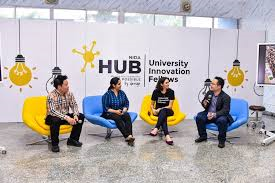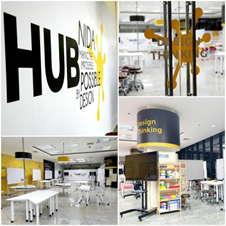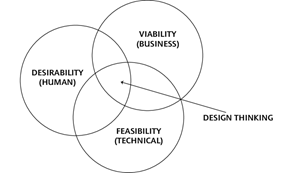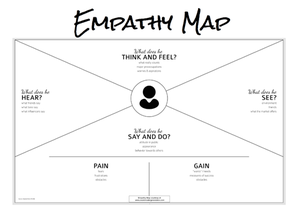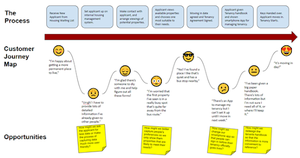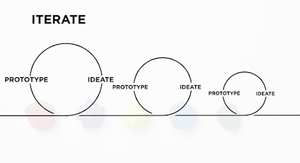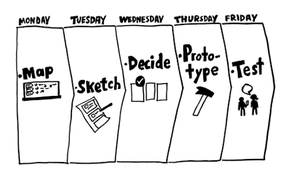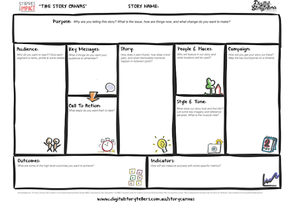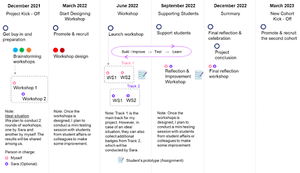Priorities:National Institute of Development Administration Faculty Projects
Contents
Project Name: Extreme Affordability and Community Engagement @NIDA
Project by Faculty Innovation Fellows Candidate Danuvasin Charoen
Why is this project important to you, your department, & your Fellows?
This project is intended to solve community or organizational problems with design thinking and design sprint. It is important to me because I can offer it as an elective class and build my credibility as a design thinking champion. In addition, my students and I can publish an action research from a result of this project. Also, there might be a commercialization opportunity if we can convert the prototype into a real product or platform. The project is important for the department because it can create a community and/or business engagement which is one of the key performance indicators for my department. This project is important for the fellows because they cannot only learn and apply design thinking concepts and they can make a real-world impact.
Description
The goal of this project is to create an environment where students learn to design products, services, or processes that will change the lives of people in a community. Using design thinking and design sprint processes, students will work closely with community leaders and/or organizational partners to come up with solutions and prototype. After the project, students should come up with working prototypes that can be implemented in a community or an organization. The working prototype should be converted into a start-up project. Students need to pitch the value of the prototype together with the business model to venture capitalists.
Another objective of this project is to create a design space and innovation lab that provides space and mentorship for students to learn to solve problems using design thinking, design sprint, and storytelling. A design space and innovation lab provide not only an environment but also brainstorming and prototyping tools such as 3D printers. The lab will provide technology showcases to inspire students to create a real-world impact. Moreover, we plan to create a design and innovation forum both online and offline. We plan to invite design and innovation experts to share tips, techniques, and experience in order to inspire others to make a change to create a real-world impact.
Stakeholders served
- Community’s leaders
- A venture capitalist (VC) who is willing to fund the project.
- People in a community and/or employee in organizations
Key Milestones
- December 2020: We locate the community and organization that are willing to work with us. We conduct design thinking workshops for the community. Website is created.
- March 2021: Design Space and innovation lab is established. Low fidelity prototype is proposed.
- June 2021: First working prototype (high fidelity) is developed and tested.
- September 2021: Community impact assessment is done
- December 2021: Commercialization and Submit the final report to d.School
- March 2022: Silicon Valley Meetup and Project Presentation
An Innovation Portfolio
Project Name: Innovation Hub and Social Labs at NIDA Business School
A Technological Data-Driven Design Journey for Teaching and Learning Emerging Technology Initiatives
Project by Faculty Innovation Fellows Candidate Jongsawas Chongwatpol
Why is this project important to you, your department, & your Fellows?
Design thinking can be embedded in the learning processes and enabled in the context of any emerging technology initiatives in the classroom environment, especially in the proof of concept stage. MBA Students at NIDA Business School will need a practical view on integrating the mindset and toolset of the design thinking approach in the creative learning process as a case based in-class experience in dealing with digital disruption such as Big Data, Artificial Intelligence (AI), or Business Intelligence.
I hope that the result of the Innovation Hub projects (the first & second phases) can serve as a teaching space with a guideline for coaching the design thinking team (me, our student fellows, and other faculty fellows) and, as a creative learning space for students, can be enlisted to help students frame their creations and that these practices have a valuable contribution as alternatives when designing curricula for teaching and learning any emerging technology initiatives.
The third phase focuses on the social labs where the technologies and toolsets are ready for social innovation where students will be on the fields such as communities nearby NIDA or remotely accessed communities where there are needs for helps. With partners from industries, funding support from governments, community involvement, and NIDA as a teaching and learning support, the social labs will form a quadruple helix platform for connectivity for creatively and innovatively promoting solutions to the social/communities.
Description
The Innovation Hubs will be not only a space for the school to show case any new technologies such as robots, AI, Big Data technology, face detection, drone, AR, or VR, but also a creative space for students to creatively and innovatively learn how to apply those technologies to solve problems in real-life.
Once the technologies are in place (expected in 2021), a curriculum to integrate both design thinking concept and design-oriented information systems/technologies will be initiated.
The first project under Innovation Hub will be toward “A Technological Data-Driven Design Journey for Teaching and Learning Emerging Technology Initiatives”
This journey aims at providing guidelines for how alternative designs that emerge in the problem formulation stage of the design thinking approach are turned into prototypes in the proof-of-concept stage and are subsequently tested and implemented to reflect their proof-of-value and proof-of-use later.
The proposed data-driven design approach can serve as blueprint for structuring strategic thinking for emerging technology initiatives such as Big Data and AI through outlining five areas that form the building blocks of classroom environment.
- Problem Space
- Data Space
- Analytics Space
- Technology Space
- User Space
In each space, students will be introduced with DT activities to help them frame their creations. For instance, the learning process in each space is iterative, requiring brainstorming, mind mapping, and idea clustering for exploring and comparing the possible types of solutions.
The second project under Innovation Hub is to create teaching and learning materials for non-technical background. For instance,
- How to explain AI for non-technical background?
- How to explain Big Data analytics to 5-years old kid?
- How to teach analytics without coding?
- How to explain AI using picture not mathematical models or statistics?
The third project focuses more on the social labs, as an action research or extreme affordability projects from d.School, by the integration (Quadruple Helix) of Government (Funding Support), Academic Partners (NIDA and Universities in the communities), Partners from industries (Innovation, technology), and Communities. Students in the design thinking related courses will have a great opportunity to work and solve the problem in the communities. The class project can be a process innovation (changing process without heavy investment), a product innovation, a technology-related innovation, or new business model innovation. The goal is to use Innovation Hub and Social Labs at NIDA Business School to test run the “proof-of-concept” stages, where the prototypes can subsequently be tested and implemented to reflect their proof-of-value and proof-of-use when the financial situations allow for communities.
Hopefully the contributions will be turned academically and practically, and all parties will get benefits based on their organizational strategies.
Stakeholders served
- Students: MBA students and students from other departments
- Faculty Members
- Communities, Government Agencies, Partners from Industries
Key Milestones
- December 2020:
- In the process of getting grants for investing on AI and other technologies
- Rebuilding NIDA Hubs to support Innovation Hub and Social Labs initiative
- March 2021:
- Develop Technological-Data Driven Design Curriculums for teaching and learning for NIDA Business School.
- Writing proposals for getting grants from government or private partners
- June 2021:
- Prepare design thinking activities and toolsets for non-technical background to understand emerging technologies such as AI and Big Data
- Writing proposals for getting grants from government or private partners
- September 2021:
- Officially launch the DT
- Technological Data-Driven Design course
- December 2021:
- Get Feedbacks from this new course
- Writing proposals for getting grants from government
- Students working with communities
- Writing proposals for getting grants from government
- March 2022:
- Social Labs projects where students working with communities
An Innovation Portfolio
- Technological Data Driven Design Curriculums
- DT activities and toolsets used to cover the following “Technological Data Driven Design” spaces: Problem Space, Data Space, Analytics Space, Technology Space, and User Space
Project Name: Boost Up Soft Skills for Future Workforce
Project by Faculty Innovation Fellows Candidate Chanansara Oranop na ayutthaya
Why is this project important to you, your department, & your Fellows?
The more the future of work becomes automated, the more important people with intensive soft skills are needed and essential because the soft skills, such as emotional intelligence, empathy, adaptability, digital and data literacy, communication and creative thinking, cannot be replicated by machines. Universities are required not only to train students to possess academic skills, but also are responsible to provide non-academic support to the students for building stronger soft skills.
This project aims to develop co-curricular activities to equip the students in the campus, specifically my school’s students - Graduate School of Communication Arts and Management Innovation (GSCM), with a set of essential soft skills in order that they will gain competitive advantages in their occupation.
Description
Objectives of the project includes
- To empathize the students’ need for soft skills development and to provide non-academic support to enhance the students’ soft skills.
- To collaborate and build a network among relevant stakeholders, including the school’s alumni and student affairs, to support the students’ soft skills development.
Key activities
- My project employs the design thinking framework and tools to help the target students design their journey in developing soft skills during their life on campus. A series of workshops will be provided to the target students, including two workshops for empathy and ideation; two training workshops, one prototyping workshop, and one reflection workshop, respectively.
Expected outcomes
- The expected outcome is for students to develop some essential soft skills to meet the demand from the industry and progress in their career path. Also, I will learn some lessons on how to design co-curricular activities to support the student’s development, with hopes that this will become a distinguished value proposition of my campus to prospective students.
Stakeholders served
- Students in GSCM’s master programs
- Students from other faculties in NIDA
Key Milestones
- December 2021: Project Kick-off, Running two workshops for empathy and ideation
- Get Approval from the faculty’s committee, then Kick-off the project. Two workshops will be organized. The first workshop is to empathize with our target students on what their pain, gain and expectation about non-academic support from the school, specifically the need for soft skills enhancement. Another workshop will be an ideation session for brainstorming some ideas for the next step. The result will be shared with Dr.Bongkot, one of the members of FIF cohort 2023 from NIDA.
- March 2022: Design training workshop and PR
- After getting insights, I will collaborate with Dr.Bongkot and NIDA’s student affairs to conduct a session to identify the need for soft skills training and design learning journeys in the workshops which will be conducted in Summer. Then, the workshops will be promoted to the target students in the campus for recruiting the workshop participants.
- June 2022: Run the training workshops
- There will be two tracks of the workshops. One is of Dr.Bongkot, another is mine which include 2 different topics. The target students can choose one or both tracks and collect digital badges of each track for graduation. I also plan to invite NIDA alumni to share their experience in the workshops. After the training workshops, all participants will join in a session for prototyping their own journey to practice soft skills.
- September 2022: Test the prototype and Join a reflection workshop
- The participants will test their prototype during the semester, and then join a reflection workshop to share some lessons learned with other participants.
- December 2022: Final reflection & Celebration
- A wrap-up session will be conducted, and celebrate the participants who collect each track’s digital badges and join the reflection workshop.
- March 2023: Report to FIF community and prepare for new cohort
An Innovation Portfolio
Templates and tools in design thinking concepts such as empathy map, brainstorming techniques will be employed. In online workshops, Miro or Mural boards will be used to work collaboratively. Also, gamification will be integrated into the workshop such as digital badges collections for achievements. To build a community among the students and invited alumni, some chat apps, or FB groups will be used for communication and fostering their connections.
Project Name: Skill Up by SHRD
Project by Faculty Innovation Fellows Candidate Bongkot Jenjarrussakul
Why is this project important to you, your department, & your Fellows?
Due to the rapid change of work and society, the students must create solutions that fit specific problems for their organization. Soft skills such as creativity, digital and data literacy, and a growth mindset become essential. On the other hand, to serve our institute's goal of becoming a world-class university, our department has to improve our quality to fit a standard such as ASEAN University Network Quality Assurance (AUNQA) and other standards required as our quality control. One of its criteria in the AUNQA is "Student Support Services," which focuses on enhancing the learning experience and employability.
As most of my courses focus on creativity, thinking skills, and digital soft skills, this project could be a source of data to redesign my courses, reconnect alumni, and build my credibility in the mentioned areas. The department can benefit from this project as extra-curricular activities. Furthermore, the project could also enhance the connection between the department, and current students. Such connection, in return, will benefit the department and me as it could be a point of initiation for my further work and research.
This project is planned to be either an independent or a collaborative project with Sara, who is an applicant in the same cohort. In the case of a collaboration, several activities and resources can be shared. Therefore, the project will allow us to learn, apply, and test our ideas based on design thinking concepts. We also welcome our senior fellows and others who interest in joining.
Description
'"Skill Up by SHRD'" is a project which aims at enhancing students' soft skills. Although the department's name of SHRD is used as part of the project name, this project is opened to students from all departments. Another main objective is to create a network between the department, current students, and alumni (in case they are invited as guest speakers).
Students who join the project will be eligible to receive a certificate of completion which will be beneficial to their future career path, especially for those who have no work experience. That is because this project would facilitate students being able to apply soft skills in their journey.
In each workshop, the exploration-explanation-reflection concept will be used to guide students regarding the topic. Alumni who have expertise in the area may also be invited to join as guest speakers. Therefore, the students can discover and learn from those with first-hand experience and theory behind them.
Although this project is independent, the impact of this project can be elevated by the collaboration between Sara (Chanansara)'s and my projects. The following figure shows the whole concept of this project.
Stakeholders served
- Students: Graduate students from the School of Human Resource Development (SHRD) and students from other departments.
- School of Human Resource Development (SHRD)
Key Milestones
- December 2021: Project kick-off
- Get buy-in and approval from the department.
- Conduct a brainstorming workshop to understand students' needs and create some possible solutions. (Empathize to Ideate)
- March 2022: Start designing workshop
- Start developing workshops according to the results from the previous period.
- Promote and recruit students to join the programs.
- June 2022: Workshop
- Conduct workshops.
- After the workshops, assign students to create a prototype to apply skills they have learned from the workshops.
- September 2022: Supporting Students
- Observe and support students while they create their prototypes and test their ideas.
- Conduct a reflection session to allow students to reflect on what they learn and ideate possible ideas for improvement.
- December 2022: Summary
- Conduct a final reflection session.
- Celebrate the first cohort.
- Conclude the project and collect improvement points.
- Prepare the report to the FIF community.
- March 2023: New cohort kick-off
- Promote and recruit students to join the second cohort.
An Innovation Portfolio
The project will offer workshops and mini projects in soft skills such as creativity, digital and data literacy, and a growth mindset that are essential for the future of work. The design thinking (DT) concepts, gamification, innovative thinking system (ITS), and the LEGO® SERIOUS PLAY® (LSP) will be used as tools to conduct the whole project. Firstly, design thinking will be used as the project’s backbone. The main activities of this project are designed based on the 5-step model. Secondly, gamification will be used to develop a strategy that will engage students until the end. Badge collection, certificates, and small tokens will be used throughout the project as part of the strategy. Finally, DT, ITS, and LSP (optional & situation dependent) will be used as tools in the workshops.
To encourage Learn-from-everywhere culture, I will mainly use online platforms in the project—for example, MS Teams or Zoom, LINE, Mural, etc. However, the offline workshop might also be conducted. For the workshop, I plan to use tictoc/similar documents when designing the workshops. Worksheets, presentation slides, and other documents will also be created as needed.
Project Name: Social Innovation Entrepreneurship
Project by Faculty Innovation Fellows Candidate Anukal Chiralaksanakul
Why is this project important to you, your department, & your Fellows?
I believe that university should be a place to empower students to take on their new ideas, whether gained from the class they take or by a conversation with their peers, etc. to reality. In the process, they will learn by doing from actual experiences, and along the way, they may be able to positively change something that they care about.
Description
Just before the COVID-19, I started an incubation program at my university. The program focuses mainly on technology-based innovation. As usual, the program incubates in student teams for about 12 weeks. I would say it succeeds in its own scale since there are student teams who still continue the business as present and also teams who get funded by public corporations. During running the incubation program, however, I notice that there are a lot of opportunities that student teams can help to initiate projects that can address environmental and societal issues. Thailand is still a developing country where there are various kinds of complex environmental and societal issues. Furthermore, our university roots in social science with many experts on different environmental and societal issues.
To build up a community of people who are interested in addressing complex environmental and societal issues through the lens of innovation-driven entrepreneurship would be something that I am interested in. Innovation does not need to come from technology only. The incubation process and activities will strengthen the network of students, university experts on the issues, entrepreneurs, alumni, and community.
Stakeholders served
- University experts on complex environmental and societal issues
- Students who take classes on either innovation, social issues, environmental issues, entrepreneurship
- Entrepreneur related to social and environmental issues and can provide guidance to students
Key Milestones
- December 2023: 3 university experts agree to join + other stakeholders
- March 2024: incubation program activities and schedules complete
- June 2024: bootcamp 1 activities to build network of stakeholders
- September 2024: bootcamp 2 activities to build network of stakeholders
- December 2024: incubation program ready to start
- March 2025: finishing up incubation program
An Innovation Portfolio
All of my own materials can be shared.
Related links
